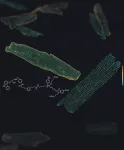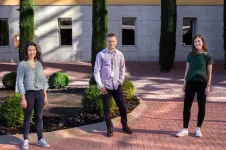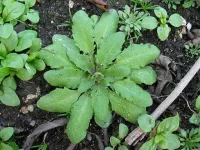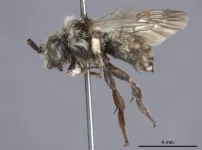New discovery of a rare superconductor may be vital for the future of quantum computing
2021-06-15
(Press-News.org) Research led by the University of Kent and the STFC Rutherford Appleton Laboratory has resulted in the discovery of a new rare topological superconductor, LaPt3P. This discovery may be of huge importance to the future operations of quantum computers.
Superconductors are vital materials able to conduct electricity without any resistance when cooled below a certain temperature, making them highly desirable in a society needing to reduce its energy consumption.
Superconductors manifest quantum properties on the scale of everyday objects, making them highly attractive candidates for building computers which use quantum physics to store data and perform computing operations, and can vastly outperform even the best supercomputers in certain tasks. As a result, there is an increasing demand from leading tech companies like Google, IBM and Microsoft to make quantum computers on an industrial scale using superconductors.
However, the elementary units of quantum computers (qubits) are extremely sensitive and lose their quantum properties due to electromagnetic fields, heat and collisions with air molecules. Protection from these can be achieved by making more resilient qubits using a special class of superconductors called topological superconductors which in addition to being superconductors also host protected metallic states on their boundaries or surfaces.
Topological superconductors, such as LaPt3P, newly discovered through muon spin relaxation experiments and extensive theoretical analysis, are exceptionally rare and are of tremendous value to the future industry of quantum computing.
To ensure its properties are sample and instrument independent, two different sets of samples were prepared in the University of Warwick and in ETH Zurich. Muon experiments were then performed in two different types of muon facilities: in the ISIS Pulsed Neutron and Muon Source in the STFC Rutherford Appleton Laboratory and in PSI, Switzerland.
Dr Sudeep Kumar Ghosh, Leverhulme Early Career Fellow at Kent and Principle Investigator said: 'This discovery of the topological superconductor LaPt3P has tremendous potential in the field of quantum computing. Discovery of such a rare and desired component demonstrates the importance of muon research for the everyday world around us.'
INFORMATION:
The paper 'Chiral singlet superconductivity in the weakly correlated metal LaPt3P' is published in Nature Communications (University of Kent: Dr. Sudeep K. Ghosh; STFC Rutherford Appleton Laboratory: Dr. Pabitra K. Biswas, Dr. Adrian D. Hillier; University of Warwick - Dr. Geetha Balakrishnan, Dr. Martin R. Lees, Dr. Daniel A. Mayoh; Paul Scherrer Institute: Dr. Charles Baines; Zhejiang University of Technology: Dr. Xiaofeng Xu; ETH Zurich: Dr. Nikolai D. Zhigadlo; Southwest University of Science and Technology: Dr. Jianzhou Zhao).
URL: https://www.nature.com/articles/s41467-021-22807-8
DOI: https://doi.org/10.1038/s41467-021-22807-8
ELSE PRESS RELEASES FROM THIS DATE:
2021-06-15
In the heart there are two different subtypes of beta-adrenergic receptors - beta1 and beta2 - which are activated by the stress hormones adrenaline and noradrenaline. They both trigger the strongest stimulation of the heart rate and pumping capacity that we know of. The two subtypes are highly similar biochemically, but differ substantially in terms of their functional and therapeutic relevance.
Both receptor types can stimulate the heart in the short term, yet when the beta1 receptor is activated over a prolonged period of time, it has a range ...
2021-06-15
DUBLIN, June 15, 2021 - Scientists have identified how and why some Covid-19 patients can develop life-threatening clots, which could lead to targeted therapies that prevent this from happening.
The work, led by researchers from RCSI University of Medicine and Health Sciences, is published in the END ...
2021-06-15
A new antibody testing study examining samples originally collected through the National Institutes of Health's All of Us Research Program found evidence of SARS-CoV-2 infections in five states earlier than had initially been reported. These findings were published in the journal Clinical Infectious Diseases. The results expand on findings from a Centers for Disease Control and Prevention study that suggested SARS-CoV-2, the virus that causes COVID-19, was present in the U.S. as far back as December 2019.
In the All of Us study, researchers analyzed more than 24,000 stored blood samples contributed ...
2021-06-15
Chemotherapy kills tumour cells by causing damage to them. One of the most effective ways of causing damage is to prevent the two DNA strands from separating so that the cellular machinery cannot read the instructions written in the genes. But sometimes, the cell manages to repair the damage and survive, evading the effect of chemotherapy. CNIO researchers have found out how the cell does that and plan to use this knowledge to enhance cancer treatments.
The key lies in a peculiar protein called PrimPol, as explained in a publication in The EMBO Journal by the CNIO's DNA Replication Group, led by Juan Méndez.
The DNA molecule harbours the genes that direct the life of the cell and, ...
2021-06-15
The University of Ottawa has been awarded four new Canada Research Chairs (CRC) that will strengthen its expertise in artificial intelligence, health and law. The University is also proud to announce the renewal of two CRCs that will conduct leading-edge research in quantum communications and photonics.
"The Canada Research Chairs Program provides invaluable support to our researchers as they forge their paths of discovery at a world-class level," said Sylvain Charbonneau, vice-president, research. "The results of this most recent competition will ...
2021-06-15
A review of more than 9,000 U.S. patients with severe COVID-19 infection showed less than 1% contracted the illness again, with an average reinfection time of 3.5 months after an initial positive test. Those are the findings from a study conducted by researchers from the University of Missouri School of Medicine and MU Health Care.
The researchers teamed up with the MU Institute for Data Science and Informatics and the Tiger Institute for Health Innovation to review data from 62 U.S. health care facilities. They found 63 of the 9,119 patients (0.7%) with severe COVID-19 infection contracted the virus a second time, with a mean reinfection period of 116 days. Of the 63 who were reinfected, two (3.2%) died. Patients categorized as ...
2021-06-15
Plants evolve specialised defence chemicals through the combined effects of genes, geography, demography and environmental conditions, a study published today in eLife reports.
The findings reveal a pattern in the types of defence chemicals plants produce across Europe, and describe some of the evolutionary processes that create them.
As plants are immobile organisms, they rely on producing defence chemicals called specialised metabolites for survival. Specialised metabolites have extensive variation in their structure, such as the number of carbon molecules ...
2021-06-15
June 15, 2021 - Canadian researchers have discovered that a bee thought to be one of the rarest in the world, as the only representative of its genus, is no more than an unusual specimen of a widespread species.
Scientists with the Canadian Museum of Nature (CMN) and York University have reclassified the mystery bee, collected somewhere in Nevada in the 1870s, as Brachymelecta californica. They note that it's an aberrant individual of a species, the California digger-cuckoo bee, that is part of a group that includes five other species. All are cleptoparasitic bees, with females that lay eggs in the nests of digger bees. Brachymelecta californica itself is known to be widespread ...
2021-06-15
A recent UCLA clinical trial has shown encouraging results in helping daily smokers who are also heavy drinkers quit smoking and cut down their alcohol intake.
The study of 165 people tested two prescription drugs -- varenicline, for smoking addiction, and naltrexone, which is used to treat alcoholism. Studies have shown that varenicline, marketed under the brand name Chantix, may also be effective in reducing alcohol consumption.
Participants, who ranged in age from 21 to 65, smoked at least five cigarettes a day, with male participants generally consuming more than 14 drinks a week and women more than seven per week.
Over the 12-week study period, each participant received 2 milligrams of varenicline twice a day. Roughly half the group -- 83 participants -- also received a 50-milligram ...
2021-06-15
Hippopotamus aren't the first thing that come to mind when considering epidemiology and disease ecology. And yet these amphibious megafauna offered UC Santa Barbara ecologist Keenan Stears(link is external) a window into the progression of an anthrax outbreak that struck Ruaha National Park, Tanzania, in the dry season of 2017.
Through surveys and GPS monitoring, Stears and his colleagues, Wendy Turner, Doug McCauley and Melissa Schmitt, revealed that reduced dry-season flows in the Great Ruaha River indirectly spread the disease by affecting hippo movement. The results, which appear in the journal Ecosphere(link is external), present a unique perspective on disease ecology and illustrate how anthropogenic changes can impact wildlife and human health.
The ...
LAST 30 PRESS RELEASES:
[Press-News.org] New discovery of a rare superconductor may be vital for the future of quantum computing






